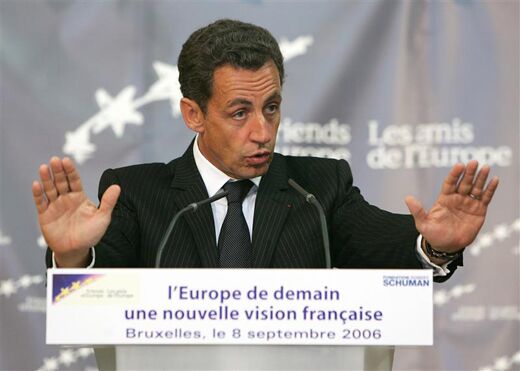
New Plan for a United Europe Proposed
While delivering a speech to the Brussels-based Friends of Europe organization September 8, French interior minister and presidential hopeful Nicolas Sarkozy injected what EUobserver.com termed “fresh elements” into the ongoing discussion regarding the European Union’s “institutional architecture.” Among his suggestions, Sarkozy presented ideas for a “mini-treaty,” a European foreign minister, and innovations to the European Commission.
Sarkozy would like the choicest parts of the recently failed constitutional draft proposal rolled together and ratified in 2007. He termed his idea a “mini-treaty.” To expedite this process, Sarkozy hinted that elements of contention within the constitution should be set aside. “Speaking in Brussels to an audience of international press, [non-governmental organizations], EU officials and business leaders at Friends of Europe on 8 Sept., 2006, the French minister stirred up the debate. His new propositions include a ‘mini-treaty,’ which would take up ‘about two thirds’ of novelties from the constitution that were ‘not critical’ issues during the failed referenda in France and the Netherlands” (EurActiv.com, September 8).
In an interview with the French daily Le Monde, Italian Prime Minister Romano Prodi echoed Sarkozy’s suggestion to chop down the constitution. “In my opinion it is possible to restart the constitutional project, but in a greatly simplified form,” he said.
Among the “fresh elements” suggested by Sarkozy is his constitution ratification procedure. Rather than have the treaty ratified at the voter level, he suggested that the ratification occur at the parliamentary level. In other words, don’t worry about what European voters think.
Understandably, not everyone is enamored with Sarkozy’s plan to circumvent the public vote on any new constitutional offerings. The Young European Federalists organization stated, “We are … skeptical about the mini-treaty …. Its ratification through national parliaments looks like an entry into force of the rejected constitutional treaty by the back door.”
For the European Union to become a federalist state, its member nations must agree to divest their sovereignty to the European Union. What Sarkozy is suggesting is altogether undemocratic in application. Though it may appear to be a convenient path to ratification, it is a dangerous slope to tread. If European leaders agree to national parliament ratification of the next treaty proposal, it heralds a dangerous shift away from democratic notions to shades of absolutist governance.
Sarkozy proposed that the new mini-treaty be drafted and approved during Germany’s 2007 presidency. For its part, Germany has said it intends to make the EU constitution one of its main priorities once it assumes the rotating presidency of the European Union in January 2007.
Key details of Sarkozy’s mini-treaty include creating an office of foreign minister—an idea he said enjoys a “large consensus”—and reforming the European Commission.
Presently, the European Commission consists of appointed delegates from member nations, but Sarkozy envisions something radically different. He would like to see the Commission consist of an elected president who would then appoint his own cabinet. “Why aren’t we bold … and leave the composition of the Commission to its president? … [A]fter all, it’s on the basis of this logic that national governments are formed,” he stated (EUobserver.com, op. cit.).
When French and Dutch voters rejected the last EU constitution proposal in 2005, what has been termed a one-year “period of reflection“ began. Now that that year has passed, some European leaders have begun to renew their desire to finish what their predecessors started more than 50 years ago: to integrate member states into one supra-national federalist state. Empowering the EU with a powerful European Commission president, in the ilk of many national presidents today, in addition to adding a foreign minister who could speak with unanimity on behalf of the Union, may have broad appeal among member states.
The path toward a stronger future for Europe is becoming more and more clear; the question is, how quickly will Europeans embrace it? Sarkozy’s specific plans typify the kinds of grand notions gaining support among the EU elites, and some form of them appears increasingly likely to be implemented. The Trumpet has been anticipating this eventuality.
